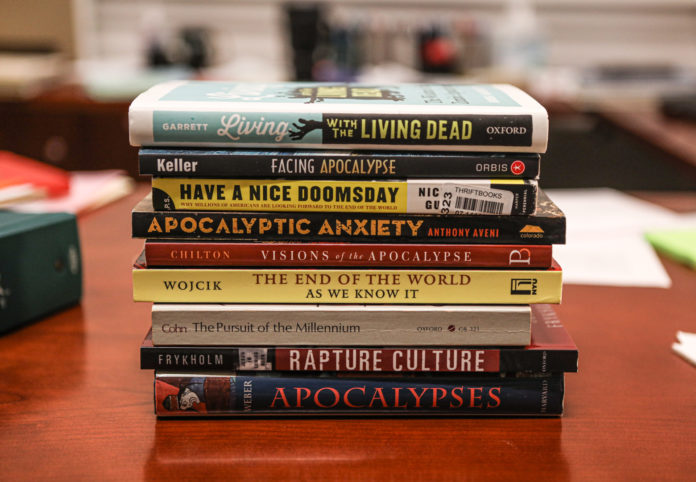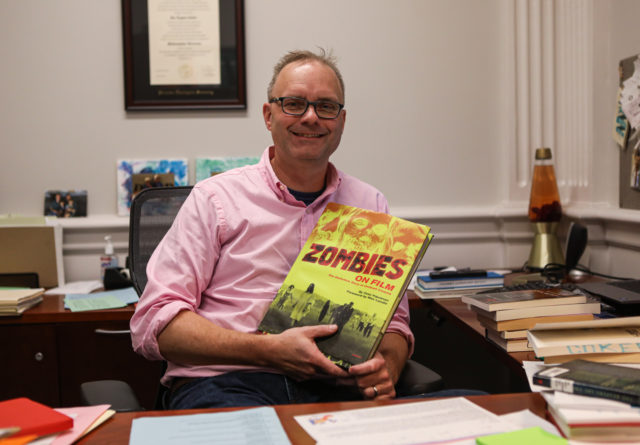
By Shelby Peck | Staff Writer
Most Baylor students are familiar with classes such as Christian Scriptures, U.S. in Global Perspective or Chapel because they are required to graduate. Deep within the pages of the course catalog, however, are classes covering unfamiliar and head-turning topics. Here are just a few of them.
BIO 3100: Anatomy of a Superhero
Are superheroes real? Dr. Jonathan Miles, senior lecturer in biology, said this question fascinated him throughout his childhood and led to his career in the field. It also led him to ask the chair of the biology department to start a student-led, research-based class to find an answer to his long-asked question.
In this one-hour course typically offered in the spring, students are able to form groups and conduct research into various human conditions that could be compared to superpowers.
“Students are really good at finding these abnormalities that are out there…[and asking,] ‘Is there something in the animal or plant world that equates to these powers, and would they be possible in a human?’” Miles said.
Some of the conditions found in the class include abnormalities where people have incredibly strong bones, connective tissue disorders that cause stretchy skin, presence of rough patches and plant communication through pheromones.
“Students get to put some kind of use to all the biology courses they’ve taken over the years,” Miles said. “Everything can kind of come together and we see this bigger picture of life.”
REL 3331: Zombie Apocalypse and Christian History
Yes, there is a class that discusses “The Walking Dead” and “WALL-E.” Dr. Joe Coker, senior lecturer of religion, said he had the idea for the class approximately six or seven years ago. It’s a hybrid of his fascinations with modern zombie films and Christian Apocalypticism.
“I want us to be thoughtful about things like our fascination with the apocalypse,” Coker said. “Think about why [apocalyptic literature] was written and how it functions, how it continues to serve a purpose for us today but maybe not exactly as a blueprint for how world events are going to play out.”

The class explores the apocalyptic genre — all the way from Revelation and the Bible to modern films such as “World War Z” — and gives students a clear picture of the Apocalypticism’s development. Coker said his favorite unit covers modern end-time beliefs and speculations, specifically among conservative evangelicals and their fascination with current events in Israel.
Coker said he hopes students who take this class understand the idea of how people think about the future as a source of hope to move forward, and how it will sustain them in the present.
“That’s the way apocalyptic literature worked 2,000 years ago, and in a lot of ways that’s the way apocalyptic film works today,” Coker said.
FORS 3350: White-Collar Crime
Forensic science is the second-largest minor offered at Baylor. Because of the influx of students taking forensic classes, former Texas Ranger and professor Jim Huggins participated in redesigning the program.
“I try to bring real-world experience into the classroom,” Huggins said. “I bring my cases in there; they look at my cases and take them apart. They look at photos. I don’t hold anything back. They see everything except standing in the crime scene.”
Huggins said he wants to give students practical training that will benefit them in various professional fields. In addition to White Collar Crime, he teaches various upper-level forensic courses including Crime Scene Investigation, Bloodstain Pattern Analysis, Expert Witness Testimony and Forensic Firearms Examination.
“In those courses, I build in lab components so that they’re getting some form of practical hands-on aspect,” Huggins said.
The White-Collar Crime class includes Huggins bringing “tens of thousands” of documents for students to tediously sort with the lens of both investigative and forensic examination. While taking Expert Witness Testimony, students must memorize tremendous amounts of information to properly play different characters in Baylor’s School of Law Practice Court.
“I try to bring everything in there so they can see the practical applications of what they’re learning,” Huggins said. “Having someone that has worked those kinds of cases, that has been in those kinds of situations, has been an invaluable trait.”
ENG 3378: You Can Read Moby Dick
Each semester, English professors take turns to allow them to teach a class specialized to their individual interests. This semester, associate professor Dr. Dan Walden is using his opportunity to help many students read “Moby Dick.”
“Every time I’ve taught ‘Moby Dick’ in the [ENG] 3380 class, I’ve always felt as if I don’t have enough time to spend on it. So in this class, we’re doing eight whole weeks just on ‘Moby Dick,’” Walden said.
A portion of the class pertains to the background of author Herman Melville and what influenced him while writing the novel. The class spends time in Genesis to learn about Ishmael, the subject of the novel’s opening line, and reads 1 Kings when discussing Captain Ahab.
“‘Moby Dick’ has everything in it. It’s a very weird book,” Walden said. “It’s one of those books that’s intimidating to a lot of folks, and it is. If you go into it the wrong way, then it can be overwhelming, and it’s easy to get lost.”
He said many students are often hesitant to read “Moby Dick” because of the length and variety of writing styles, which include encyclopedia-natured entries about whales and dialogue formatted like a play. Because of the variety within its pages and the connection he formed with the novel as an undergraduate student, Walden said it has become his favorite book.
“I’ve absolutely loved introducing it to people and having them get through it and see some of the things I see too,” Walden said. “It’s a book that is relatable to just about every other mindset, interest or career. Every time I read it, I get something different out of it.”





